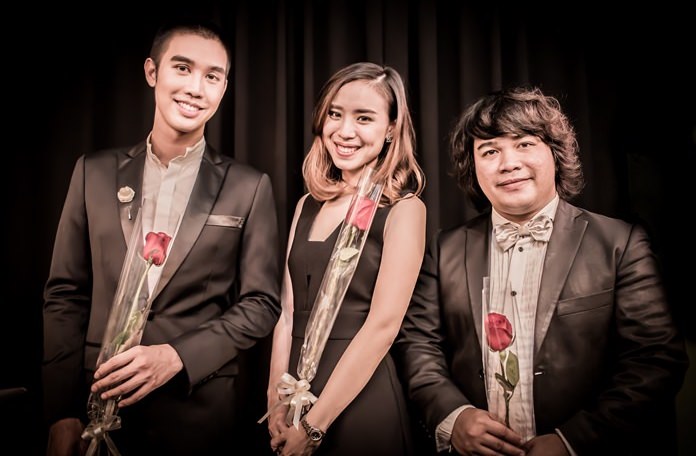A friendly and enthusiastic audience welcomed members of Grand Opera Thailand to a concert at Ben’s Theater in Jomtien recently. They included Auranus Yuenyonghattaporn (soprano), Saran Senavanin (baritone) together with pianist Morakot Cherdchoo-ngarm.

Saran (Rain) opened the programme with the aria Et in Spiritum sanctum from Bach’s Mass in B minor and it was clear that his voice has grown in strength since his last appearance here. He seems more confident too and his assured performance of this rather challenging aria was well received. I was impressed by his accurate intonation and careful phrasing.
Of course, Rain is no stranger to Ben’s Theater and has appeared there many times. He began his professional career six years ago with Opera Siam and played key roles in Bizet’s “Carmen” and in Puccini’s “Tosca”. In 2012, he performed in Somtow Sucharitkul’s opera, “Mae Naak” at the Bloomsbury Theatre in London. This year, he is a featured artist with the Japan-America Institute for New Music.
The Bach aria was followed by three delightful songs by Gabriel Fauré. Les Roses d’Ispahan was composed in 1885 and it’s one of the composer’s best-known songs. Auranus (Jing) captivated the audience with a charming performance. Her voice was perfect for this song – a beautiful, delicate sound with bell-like clarity and spot-on intonation.
Fauré’s well-known Au Bord de l’eau comes from an early set of songs and Rain gave a confident performance with a smooth transition into the high register in which he produces a lovely tone quality. This was also noticeable in Clair de Lune, another popular song by Fauré, composed in 1887 to words by Paul Verlaine and once described as “the quintessential French melody”. The ever-reliable Morakot Cherdchoo-ngarm provided beautifully lyrical accompaniments.
Jing gave a superb reading of two songs by Robert Schumann composed in 1840. Die Lotusblume is a popular recital piece with a delicate and sustained melody. Jing’s top notes are delightfully clear and perfectly in tune and in Der Nussbaum her finely-controlled voice with its gorgeous tone quality seemed to float effortlessly above Morakot’s beautifully phrased and sympathetic piano accompaniment. For me, this was undoubtedly one of the highlights of the evening.
Richard Strauss is known especially for his operas and orchestral tone poems. He was also a fine song-writer and the concert included several examples beginning with Morgen! which dates from 1894. Performed by Rain with commendable German diction, his sotto voce tone was finely controlled and expressive. Once again, pianist Morakot demonstrated his remarkable ability to switch effortlessly from one musical style to another.
Jing gave a compelling reading of Allerseelen, the last in a collection of eight songs written in 1885. She brought a great sense of drama and contrast to the song and the last phrase was especially lovely. There were some charming moments in her performance of Die Nacht.
Jing gave her first performance in Pattaya last year at the Thailand Philharmonic Orchestra’s concert at Phornprapha Botanic Gardens. She has won prizes at the RSU vocal competition at Rangsit University and at the Princess Maha Chakri Sirindhorn French Song Competition. She starred in both “Ghost Opera the Musical” at Mahidol University and played the principal character in Mozart’s “Cosi Fan Tutte”.
The recital at Ben’s gave Jing the opportunity to shine. Her singing of Bellini’s Vaga Luna was touchingly beautiful and to my mind at least, as near perfect as you can get. With sensitive piano playing it was another of the evening’s highlights. There was a lovely performance of Debussy’s 1880 song, Nuit d’étoiles with its soaring melody and rich harmonies. Her singing of Deh Vieni, non tardar from Mozart’s “Le Nozze di Figaro” had excellent characterization, clear high notes and a finely articulated piano accompaniment from Morakot. He’s a fine concert pianist in his own right and has won prizes in the Yamaha Thailand Music Festival and in the Bangkok Chopin Piano Competition. He has recently completed his Bachelor Degree in Composition from Mahidol University.
In complete contrast to the Mozart, Rain sang another Richard Strauss aria Lieben, Hassen, Zagen from his 1912 opera “Ariadne auf Naxos”. He gave a powerful, declamatory and compelling performance. As an encore, he also sang the much-loved song by Poulenc, Les Chemins de l’Amour which dates from 1940 though seems to evoke the Paris of twenty years earlier. Rain gave a telling performance, with a fine sense of phrasing and timing. It was yet another highlight of the concert which culminated in an encore duet, Lippen Schweigen from Franz Lehár’s opera “The Merry Widow”, bringing the evening to a joyous conclusion.




